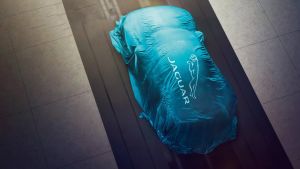Land Rover is to launch six pure-electric models within the next five years as part of a wide-ranging review of the overall Jaguar Land Rover business by its incoming chief executive Thierry Bollore, while sister brand Jaguar is to be reimagined as an all-electric luxury brand by 2025.
Jaguar Land Rover says that all of its brands’ nameplates will be available with an all-electric variant by 2030. And while Jaguar will be exclusively EV around five years before then, Land Rover should be selling around 60 per cent of its cars in pure-electric form by the end of the decade.
- SEE MORE Best electric cars to buy 2021
Announced this morning, the sweeping changes will take effect from 2024, when Land Rover launches is first pure-electric model. A company release stated, “In the next five years, Land Rover will welcome six pure-electric variants as it continues to be the world leader of luxury SUVs through its three families of Range Rover, Discovery and Defender. The first all-electric variant will arrive in 2024.”
The plans for Jaguar are more complex - and require a reversal of a long-term project to develop the next-generation all-electric XJ flagship limousine. That car was expected to make its debut this year, but has now been scrapped.
The statement said, “By the middle of the decade, Jaguar will have undergone a renaissance to emerge as a pure-electric luxury brand with a dramatically beautiful new portfolio of emotionally engaging designs and pioneering next-generation technologies. Jaguar will exist to make life extraordinary by creating dramatically beautiful automotive experiences that leave its customers feeling unique and rewarded.
“Although the nameplate may be retained, the planned Jaguar XJ replacement will not form part of the line-up, as the brand looks to realise its unique potential.”

There is no word yet on how the Jaguar plans will affect existing vehicles like the XE, XF, E-Pace and F-Pace. Although all of these models would now appear to have a finite lifespan, with all-electric replacements due by around 2025.
The decisions come after Jaguar Land Rover appointed ex-Renault executive Bollore to replace former CEO Dr Ralf Speth. The Frenchman started his new post last September but has kept a determinedly low profile as he undertook a full review of JLR’s business, current model line-up and future launch plans.
The release states that Jaguar Land Rover is able to retain all of its current production facilities, thereby quashing rumours that one of its UK factories might have been under threat of closure.
A new strategy depending on three platforms compatible with pure-electric powertrains has been launched. Land Rover will use JLR’s Modular Longitudinal Architecture platform (MLA) for electrified combustion-engined vehicles, and the Electric Modular Architecture (EMA) for its EV models.
Jaguar will use new “a pure-electric architecture”, JLR says. It will be a bespoke platform for the brand, and it will be manufactured at Solihull alongside cars using the MLA platform. EMA vehicles will be produced at Halewood. According to Bollore, the platform strategy means that there will be "very different personalities for the brands."
The Castle Bromwich site - home of the Jaguar XE, XF and F-Type - will continue to produce those models until the end of their current lifespans, after which the facility is to be repurposed for the brand's new pure-electric strategy. Bollore would not expand on what purpose will be found for Castle Bromwich, but its use case will "benefit from a consolidation" of the firm's other Midlands-based production facilities. It's a hint that the site could be turned into a battery cell assembly plant or similar.
Alongside all-encompassing electrification, JLR will also invest heavily in the hydrogen economy, with hydrogen fuel-cell vehicles in the company's plans, prototypes of which will begin rolling on UK roads the next 12 months.
Diesel power will be phased out from 2026 onwards, while the final combustion engined JLR passenger car will cease production in 2036 - the company plans a zero tailpipe emission line-up from this year onwards. The firm is targeting to be net-zero carbon across its products, production facilities and supply chains by 2039.
Are you sad to see the end of Jaguar's plans for an all-electric XJ limousine? Let us know your thoughts in the comments section...
from Sitewide RSS feed https://ift.tt/2N7bnsB
No comments:
Post a Comment